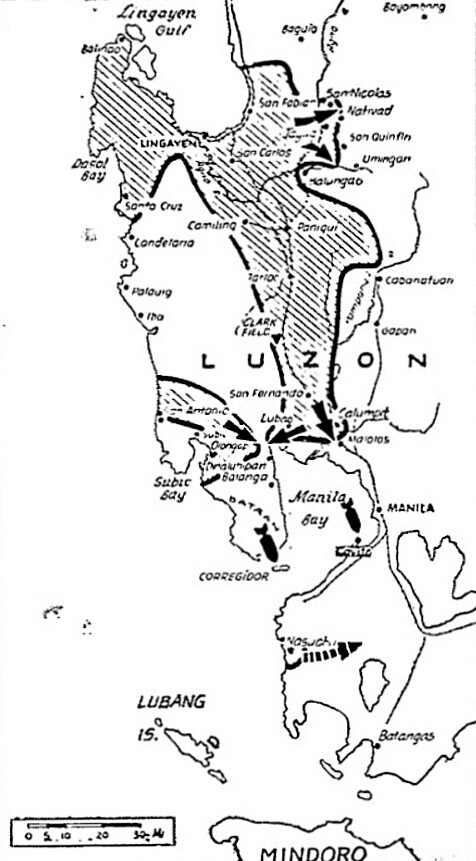The Pittsburgh Press (February 2, 1945)
TWO ARMIES CLOSE ON MANILA
Yanks ashore southwest of Luzon capital
Other troops gain north of city
New Luzon landing by the Eighth Army put U.S. forces ashore at Nasugbu, southwest of Manila, as Sixth and Eighth Army troops drove on the city from the northwest.
GEN. MACARTHUR’S HQ, Luzon, the Philippines (UP) – American tanks and infantrymen converged on Manila from two sides today.
The capital and the entire Jap defense system in southern Luzon were outflanked with a surprise landing 13 miles below the mouth of Manila Bay.
Amphibious forces of the U.S. Eighth Army, knifing into the enemy’s thinly-held west coast defenses for the third time in 48 hours, swarmed ashore early Wednesday at Nasugbu Bay, 41 miles southwest of Manila.
The landing was completed without loss and at last reports the Americans were advancing inland through weak opposition at a pace that may have already carried them to the shores of Manila Bay, within artillery range of Corregidor.
Liberate internees
Troops of the U.S. 11th Airborne Division who carried out the new invasion captured Nasugbu town, liberating a colony of interned European nationals, and struck out for Tagaytay Ridge, 20 miles to the east, where Highway 3 curves northward to Manila.
The operation started out as a “reconnaissance in force” by units of the 11th Airborne Division, but was turned into a major landing by on-the-spot orders of Lt. Gen. Robert L. Eichelberger, commander of the Eighth Army. He ordered the landing when the first assault units reported only token opposition.
Tokyo broadcasts said the Americans now have at least eight or nine divisions on Luzon and asserted that about 11,000 to 11,200 Yanks have been killed or wounded in the first three weeks of the campaign. The enemy accounts contended that the main Jap forces on the island have not yet been engaged.
Patrols operate freely
The new thrust broke open the back door to Manila, already menaced by U.S. Sixth Army veterans moving down from the north. The Sixth Army’s 37th “Buckeye” Infantry Division was reported 20 miles or less north of the capital, on and probably beyond the Angat River line below Calumpit.
Gen. Douglas MacArthur’s communiqué said the 37th Infantry Division’s patrols were operating freely throughout the area, indicating that the Japs were making no attempt at a determined stand above the capital.
Caught between the two American columns, the Japs in Manila faced the prospect of retreating southeastward around the shores of Laguna de Bay within the next few days of being trapped and annihilated inside the city. Their only other alternative was a flight to Corregidor for a death stand on “the Rock.”
Battle near Clark Field
As the battle for Manila moved into its final stage, fierce fighting in the foothills of the Zambales Mountains 50-odd miles to the northwest, where several thousand Japs were being bombed and shelled out of their hilltop positions just west of Clark Field and Fort Stotsenburg.
Considerably weaker resistance faced the U.S. Eighth Army spearheads advancing eastward across the 18-mile-wide base of Bataan Peninsula from the recaptured Olongapo Naval Base at the head of Subic Bay. Vanguards of the Eighth Army were reported nearing Dinalupihan, 13 miles east of Olongapo, where they were expected to seal off the peninsula by joining Sixth Army forces moving down from Lubao, 10 miles to the northeast.
Far to the north, other Sixth Army forces beat down savage Jap opposition northeast and east of the Lingayen Gulf beachheads. An enemy column was ambushed and destroyed on the Umingan–Balungao road near the eastern end of the American line. The Japs suffered heavy casualties and eight of their medium tanks, eight artillery pieces, 15 tracked vehicles and many supply trucks were destroyed or captured.
Gain four miles
In the upper Agno River sector 10 miles north of Umingan, U.S. troops drove four miles east of Tayug to the Nativad area, while three miles farther north they captured San Nicolas after a six-mile advance eastward from San Manuel.
U.S. heavy bombers dropped 152 tons of bombs on Corregidor and the Cavite Naval Base in Manila Bay, while other raiders swept the enemy’s road lines and airfields in northern Luzon, destroying five grounded planes at the Loag and Tuguegarao airdromes and sinking a small freighter and eight barges off the island’s north coast.
Fighter-escorted PT boats sank another coastal vessel, two barges and two small craft in a sweep around the east coast of Luzon.
Long-range U.S. fighters destroyed six and probably eight more Jap planes in a daylight sweep over Formosa and other raiders set fire to a 10,000-ton enemy tanker south of the Sakishima Islands.
Tokyo broadcasts said Jap submarines torpedoed and probably sank two large American transports and an oil tanker off the west coast of Luzon Tuesday and that a U.S. submarine was sunk by air action somewhere in the Western Pacific.
